On December 1, 2021, the BMW Center for German and European Studies (CGES) at the Walsh School of Foreign Service (SFS) hosted its third annual conference on U.S.-Irish relations, Bridging the Atlantic. Co-hosted with Georgetown University’s Global Irish Studies Initiative, the Embassy of Ireland, the Clinton Institute at University College Dublin and Queen’s University Belfast, the conference explored issues that define relations among the U.S., Ireland and the E.U.
In welcoming attendees to the event, Professor Liam Kennedy, director of the Clinton Institute for American Studies at University College Dublin, promised that the audience would hear from an “exceptional roster of speakers” on a range of topics, including U.S.-E.U. affairs under the new administration of U.S. President Joe Biden, developments in transatlantic trade and the challenge that Brexit presents to peace in Northern Ireland.
SFS Dean Joel Hellman opened the conference, acknowledging the Irish roots of the school’s founder, Fr. Edmund A. Walsh, S.J. He stressed the importance of the topics up for discussion at Bridging the Atlantic, saying, “We find ourselves in a moment where the transatlantic relationship has been facing true challenges that require constant reengagement, replenishment and rethinking.”
In her introductory remarks, Professor Katrin Sieg, director of CGES, acknowledged that many of the issues addressed at last year’s conference “are still with us,” including questions about pandemic recovery, the development of a green Irish economy and the future of the peace process.
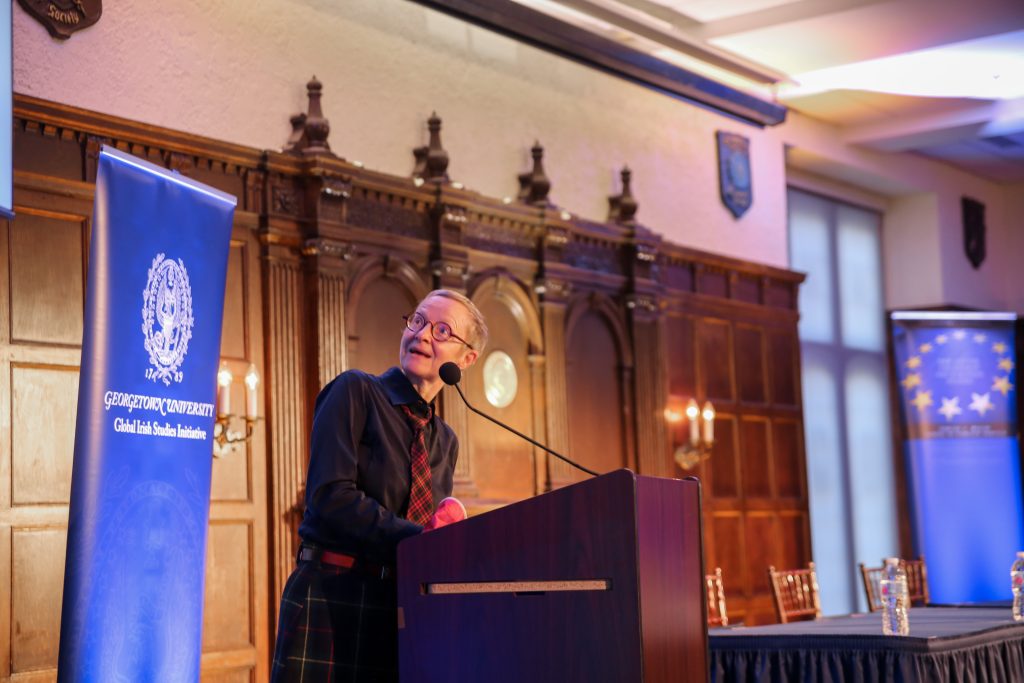
Rethinking U.S.-Europe Relations
The opening panel, U.S.-Europe Relations Under New Transatlantic Leadership, explored the Biden administration’s approach to key European issues.
Moderator Dr. Thomas Wright, director of the Brookings Institution’s Center on the United States and Europe, noted that many European leaders welcomed Biden’s signals about reestablishing diplomatic relations with Europe that were strained under President Trump. Nonetheless, he asked, did panelists have any misgivings nearly a year into Biden’s presidency?
Many of the speakers remarked upon the continuity in policy between the two administrations. “Biden is Trumpism with a human face,” said Financial Times associate editor Ed Luce, who pointed to the president’s hesitancy to relaunch the Transatlantic Trade and Investment Partnership — a proposed trade agreement between the United States and the European Union that stalled under Trump — as just one example of how little had changed between the two governments.
Heather Conley, president designate of the German Marshall Fund, advocated for rethinking the relationship between Europe and the U.S. “We need to relearn alliance management and modern alliance management in the 21st century,” she said. “We have to fundamentally repurpose this relationship.”
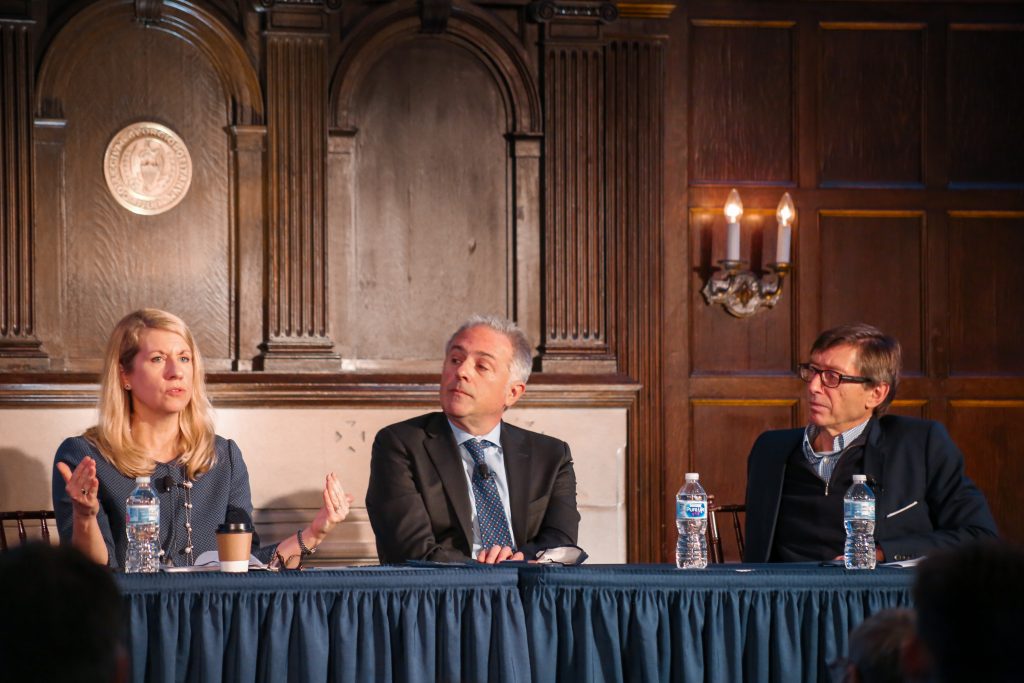
As the conversation turned toward specific threats to harmonious U.S.-E.U. relations, Ambassador Peter Wittig, who has served as Germany’s ambassador to the U.S. and U.K. and is currently a CGES senior fellow, assessed the changing geopolitical landscape reshaping international relations. “[European leaders] have to accommodate themselves with the U.S.’s strategic shift from Europe and the Middle East to the Indo-Pacific,” he said. How the United States and Europe deals with China, he also argued, would be the “litmus test for transatlantic relations.”
Panelists also expressed concerns about Russia and the possibility that Putin may launch an invasion of Ukraine. Conley was troubled by the lack of influence that the U.S. had over Russian foreign policy. “We are constantly reacting to Russia’s actions; they are not reacting to our agendas in any way,” she said. “Quite clearly, it will be a profound test for the Biden administration.”
Ireland-U.S. Partnerships Across Sectors
The second panel, U.S.-Ireland Trade and Investment: A Two-Way Street, explored economic relations. A prevailing theme in the discussion was Ireland’s trajectory from beneficiary of U.S. investment to key U.S. economic partner.
Panelist Marjorie Chorlins, senior vice president for European affairs in the U.S. Chamber of Commerce, applauded Ireland’s economic development as a “good news story” in a period of uneasy U.S.-Europe relations. She pointed to numerous factors, including the country’s favorable tax policies, that had made Ireland attractive to U.S. business and investment. Chorlins also highlighted the important role Ireland played as a U.S. partner on the international stage, “Ireland is important on its own and as a platform, a bridge, to the E.U.,” she said.
Moderator Niamh King, deputy director of the Aspen Strategy Group and Aspen Security Forum, picked up Chorlins’s praise for Ireland’s tax regime, asking whether a recent deal, brokered by the Organization for Economic Cooperation and Development and signed by 136 countries, including Ireland, to create a global minimum tax rate of 15 percent for large companies would hinder economic growth. Ambassador Daniel Mulhall, the current Irish ambassador to the U.S., admitted that Ireland was loath to adopt the new measures but “recognized that there was an international groundswell in favor of a global minimum tax.”
He was optimistic that Ireland’s consistently pro-business government, high public support for the European Union and strong track record of U.S. business success would ensure that Ireland remains a top destination for American investors and companies. He remarked, “Our tax regime is one of maybe four or five factors that has driven the transformation of the Irish economy.”
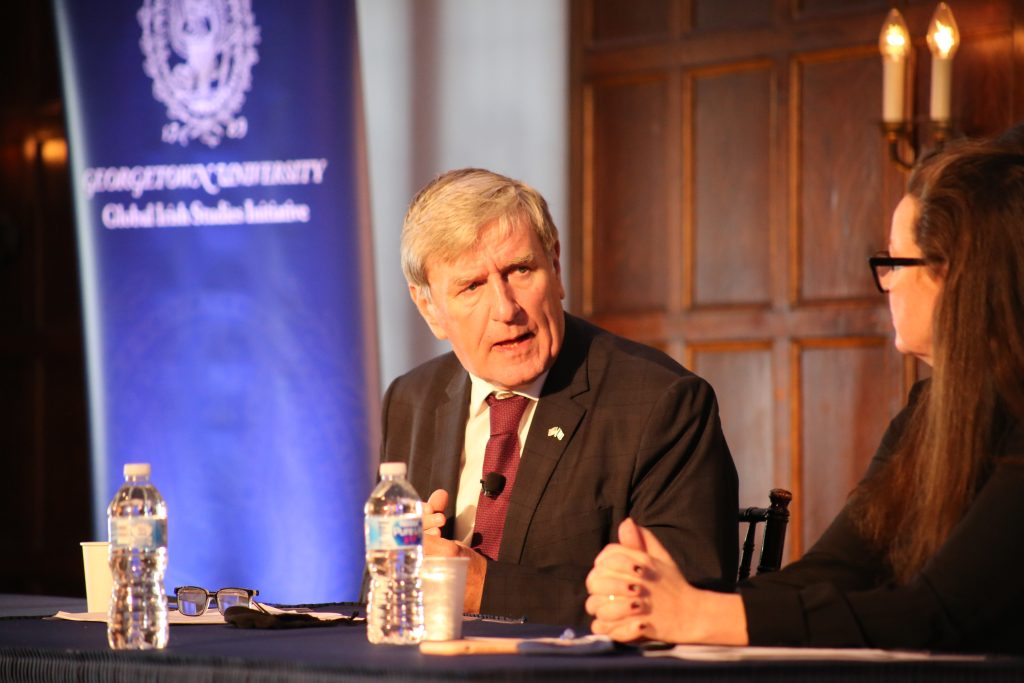
Other panelists reflected on how relations between the U.S. and Ireland had evolved from building peace to creating prosperity. Siobhan Roche, director of science for the economy at Science Foundation Ireland (SFI), explained how a partnership between SFI, the National Institutes of Health and the National Science Foundation emerged from the Northern Ireland peace process and represented just one of the ways in which Ireland’s scientific community was collaborating with U.S. counterparts to produce cutting-edge innovation. Ireland, she said, offered more than just low tax rates as a “highly connected” country with strong networks of expertise, especially in science and technology.
Jayne Brady, head of the Northern Ireland Civil Service, focused on the specific experience of Northern Ireland as its devolved government looks to build future wealth and prosperity. Asked by King whether the uncertainties of the pandemic and Brexit would harm Northern Ireland’s economic recovery, Brady expressed optimism. She drew attention to various economic sectors that had performed well in the past two years, including the life and health sciences, research and design and the film industry. “What Northern Ireland has always been very good at…is dealing with levels of uncertainty and ambiguity,” she concluded.
Possibilities for Lasting Peace
The last panel of the conference — Protecting Peace in Ireland, Including the Role of the United States — assessed how the Northern Ireland peace process can be maintained in the wake of the U.K.’s Brexit deal and the British government’s threats to derail its Northern Ireland Protocol.
A key component of the protocol prevents customs checks along the border of Northern Ireland (which is part of the U.K.) and the Republic of Ireland (which is an E.U. member state). Maintaining an open border was a significant part of the Northern Ireland peace process. Under the Northern Ireland Protocol agreement between the U.K. and the E.U., goods entering Northern Ireland from the rest of the U.K. (England, Scotland and Wales) are subject to checks, while the border between Northern Ireland and the Republic remains open.
Dr. Katy Hayward, professor of political sociology at Queen’s University Belfast, argued that the protocol “lacks legitimacy” due to low Northern Irish representation in negotiations, which were held when the Northern Ireland Assembly was not sitting. She also described the results of survey work she conducted with a team at Queen’s, which showed that those who support Northern Ireland’s continued union with Great Britain oppose the protocol due to the “symbolic and practical ways” it distances Northern Ireland from the rest of the U.K.
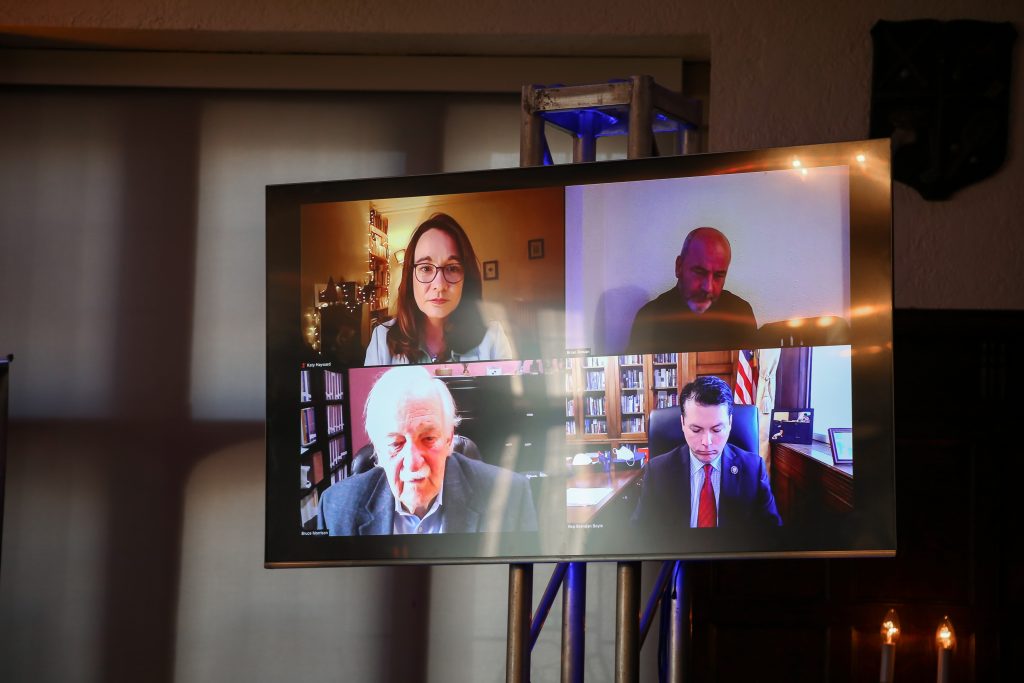
Journalist and author Brian Rowan also discussed the unionist reaction to the protocol. While there have been some instances of violence in loyalist communities, which represent a particular strand of unionism, he expects paramilitary leaders to continue to refrain from calling for widespread violence due to the harm it would cause in their own communities. Rowan also spoke of the ways in which Brexit represented a betrayal of unionists, who he said were “constitutionally unnerved” by the lack of concern shown to Northern Ireland when the British government embarked on the Brexit process.
Moderator Ted Smyth, chair of the Clinton Institute at University College Dublin, then turned the conversation toward how to maintain peace. He asked panelists whether they thought that appointing a U.S. special envoy for Northern Ireland would help secure peace in the region.
U.S. Representative Brendan Boyle (D-PA), was supportive of the idea and said that he believed that Biden would appoint someone to the position, however delays in diplomatic appointments that have plagued Biden’s administration could leave the post empty for some time. “We have seen time and time again [U.S.] special envoys who have played a positive and productive role,” he said.
Boyle reinforced the United States’ support for the Northern Ireland Protocol, warning “[If the U.K.] tore up the protocol, they’d have to live with the consequences, which I think would be quite severe here in Washington.”
Former U.S. Representative Bruce Morrison, co-chair of the Ad Hoc Committee to Protect the Good Friday Agreement, who has been touted as a potential candidate for the special envoy post, argued that the United States has a role to play in fostering better relations between segregated religious and ethnic communities in Northern Ireland. Noting that education and housing continues to keep communities apart, he stressed, “You can’t build a common future with a segregated present.”
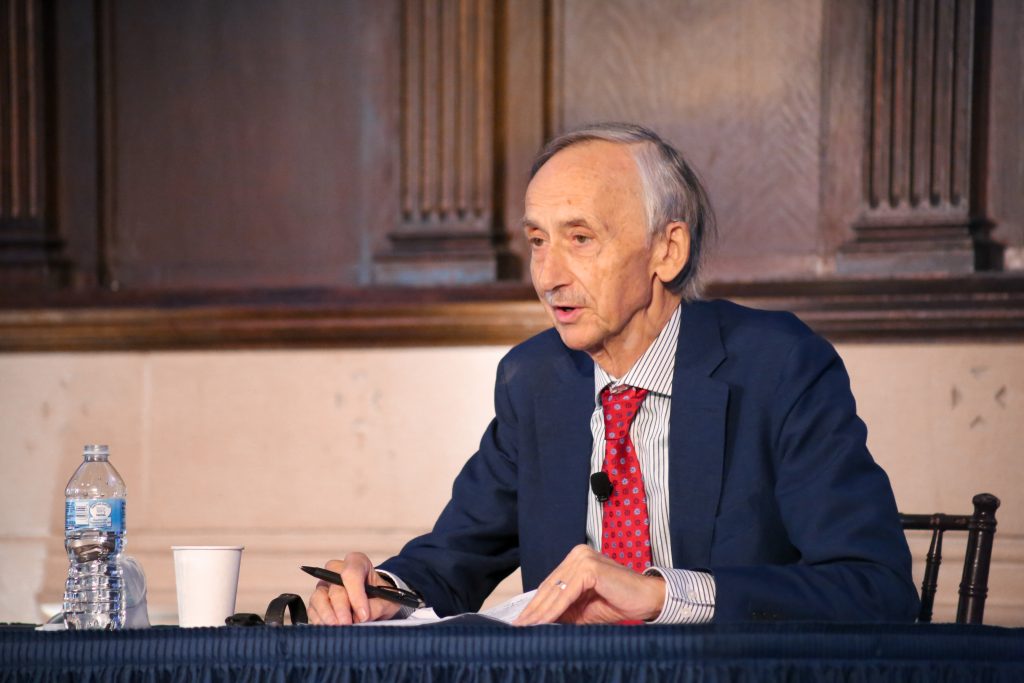
Despite persistent challenges, panelists expressed optimism about the potential for lasting peace. Morrison pointed to changing demographics in Northern Ireland, and the resulting increase in public sympathy toward closer union between the North and Republic of Ireland, as an opportunity to create new pathways to peace.
Rowan highlighted the 20 percent of Northern Irish voters who do not strongly identify with either the unionism or republicanism as proof that communities could move on from The Troubles. He advocated for a truth and reconciliation process to allow communities to reckon with the history of the conflict and embrace a new, peaceful future.
“We need to find a way of not forgetting about the past…but creating a process to address those questions,” he told the audience of Georgetown students. “We need to hand the politics of the future to the next generation.”